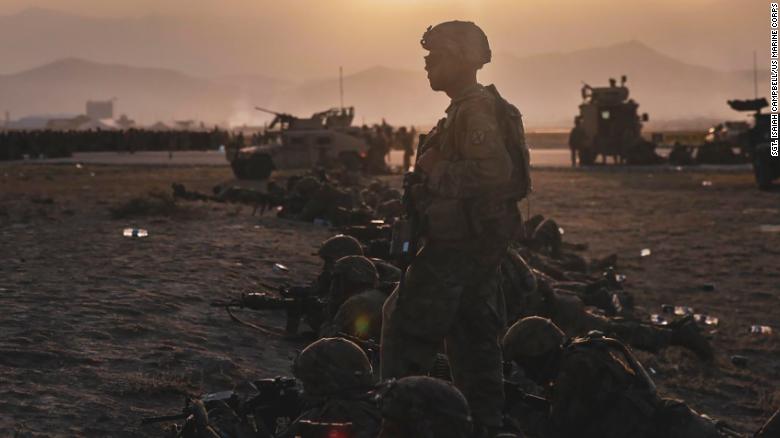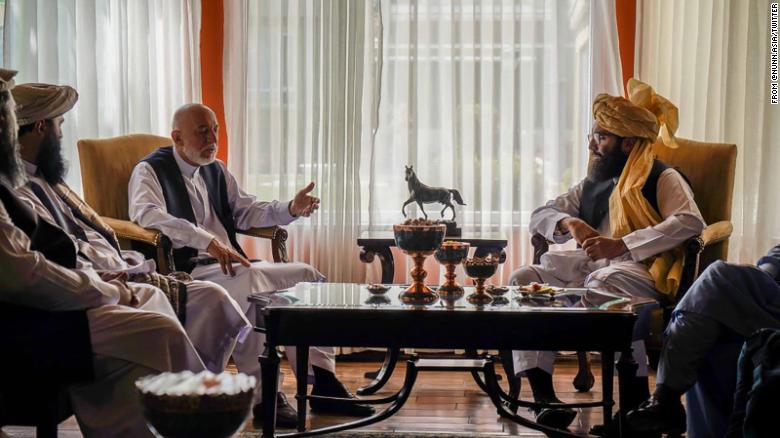Washington – While the US State Department continues to engage in high-level diplomatic talks with the Taliban in the neutral setting of Doha, Qatar, as it has for the past year, the real negotiations have moved to the chaotic streets of Kabul in recent days, where American military commanders are in constant communication with Taliban militants over security around the airport.
In an extraordinary move, the top US commander in Afghanistan, Adm. Peter Vasely, has been leading the effort to negotiate with his Taliban counterpart to maintain security at the Kabul airport and ensure the safety of both Americans and Afghans hoping to escape.
So far, talks have produced mixed results at best. US troops have secured the airport with evacuation flights taking off successfully. However, the US embassy has explicitly warned that it cannot ensure safe passage for Americans attempting to reach the airport and CNN has reported that Afghans attempting the perilous journey there have been subject to violence and intimidation.
One White House official said that while the US has several channels to the militant group, officials are still unclear about which Taliban fighters control what, and whether instructions are being properly passed down the chain of command.
“The command structure of the Taliban is not perfect,” said one diplomat who has spent extensive time in the region, which is why some agreements negotiated by leaders may not be perfectly communicated to the fighters in the streets.

Former US Ambassador to Afghanistan, John Bass, has also been dispatched to Kabul to help restore order around the airport and facilitate safe passage for Americans who are currently unable to get there, the State Department announced this week. Officials briefing lawmakers on Thursday said their hope was Bass could help resolve some of those issues with the Taliban diplomatically without having to send special operations forces outside of the airport to restore order or retrieve stranded Americans.
When State Department, Defense, and National Security Council officials were pressed on a call with lawmakers on Thursday about why the US can’t go outside the airport perimeter to get Americans, they reiterated that the US needs to remain wholly focused on the mission of securing the airport and said the hope is that Bass can help resolve any issues with citizens getting through.
US defense officials have repeatedly said this week they lack the capability to venture beyond the airport in Kabul. Taliban fighters have set up checkpoints around the city of 6 million, as well as outside the perimeter of the airport, and have been harassing and even beating Afghans trying to get through, according to multiple reports.
US officials say they are aware of the reports, with State Department spokesperson Ned Price telling reporters Thursday, “every report of someone unable for whatever reason to reach the airport is something we take very seriously,” and officials have called on the Taliban to allow safe passage to the airport for all those who wish to depart the country.
Vasely has been communicating at least once a day with a Taliban commander stationed outside the airport, Pentagon press secretary John Kirby said Thursday. “My understanding is that in a typical day there’s more than one conversation, direct conversation with their self-appointed designated commander there,” he said.
The tentative understanding now is that the Taliban will allow the US to continue its evacuation operations unhindered at the airport, as long as American forces don’t fan out into the city and interfere with Taliban rule there.
“There are no plans to expand” the US military presence in Kabul beyond the airport as of now, Kirby said on Thursday. At the same time, there is “no interest by Taliban commanders to access the airport,” he said. “It is our understanding that they understand why we’re there and what we’re doing. And again, as the secretary said, we’ve been able to have that kind of communication with them.”
Extending the deadline
A key question under discussion throughout all the talks has been the time line of the US presence in Afghanistan, and whether the Biden administration will try to remain in the country past August 31.
President Joe Biden said “yes” when asked in an interview with ABC whether he was “committed to making sure that the troops stay until every American who wants to be out is out.” But it remains an open question how long the Taliban will tolerate a major US presence at Kabul airport.
Asked during Thursday’s Pentagon press briefing whether the US would need Taliban permission to stay at the airport past the end of the month, Kirby acknowledged that “a certain measure of agreement with the Taliban on what we’re trying to accomplish has to continue to occur.”
National security adviser Jake Sullivan told reporters on Tuesday that the timetable for the US presence in Kabul was being discussed with the Taliban, but would not go into detail.
The US still has some bargaining chips: with military tools vanishing, a senior administration official told CNN that steps by the US Treasury to freeze billions in US financial institutions and prevent Afghanistan from accessing International Monetary Fund assets have become more important in sustaining Taliban cooperation on evacuations from Kabul airport.
“It’s definitely leverage,” the official said.
There are also the issues of formal international recognition and humanitarian aid — potentially significant sources of leverage for the US and allies, diplomats said.
Questions about Doha
Meanwhile, questions remain about the negotiations for a future Afghan government.
The State Department has said there has been no transfer of power, and has not made clear who the US recognizes as the leader of Afghanistan following the capitulation of Ashraf Ghani from Kabul.
Special Representative Zalmay Khalilzad remains in Doha, but “much of the Taliban delegation, if not all of it, has relocated from Doha to Afghanistan,” Price, the State Department spokesperson, said Thursday.
“We’ve continued to be in touch with those representatives over the phone, we’ve been in touch directly on the ground with them as well, as well as with the Islamic Republic representatives,” Price said.
Khalilzad, who was appointed to his current role under the Trump administration, has led the talks for more than a year, although some within the White House and on Capitol Hill have expressed deep frustrations with his performance.
Late last week, the Biden administration quietly sent a top State Department official to join the US negotiating team in Doha, according to two sources familiar with the matter.
The arrival there of the State Department Director for Policy Planning, Salman Ahmed, signaled that the Biden administration felt that it needed reinforcements as the situation on the ground in Afghanistan deteriorated by the hour and frustration mounted that the talks in Doha had not produced any breakthrough commitments from the Taliban.
Ahmed has spent significant time previously at the United Nations working on peace processes. Gen. Frank McKenzie, the commander of US Central Command, has also been a part of the talks in Doha.
The discussions between the US and the Taliban there have largely been focused on safe passage for Americans and Afghans who are trying to head to the airport to leave the country, said a source familiar with the discussions. There are also a wide range of options being discussed around what the next few weeks and few months will look like, including the possibility of extending the US presence at the airport in Kabul beyond the end of the month, the source said.
Anger on the Hill
On Capitol Hill, the lack of clarity coming from the administration was a source of bipartisan frustration Wednesday during briefings for some Senate and House lawmakers on Afghanistan, according to two sources familiar with the closed-door sessions.
Lawmakers on both sides of the aisle have called on Biden to extend the deadline if needed to get all Americans out of the country, and while some took the President’s latest comments as a positive sign, many remain concerned given the urgency of the situation, according to multiple congressional sources.
“Democrats and Republicans are angry … we have to get people out of there,” one congressional source said after Thursday’s call with administration officials.
“They were not giving us any kind of specific information,” the source added. “I’ve got people like at the gate that need to get out, what am I supposed to tell them?”
Congressional offices have been inundated with calls from constituents to help friends and relatives who are trying to escape get out of the country, both American citizens and Afghans who worked with the US and are vulnerable. Lawmakers have been given a State Department email to funnel all requests to get the names of Afghans into the proper channels for evacuation. Congressional sources said the State Department has generally been responsive, even if they didn’t have answers about how people were supposed to make it to the airport, especially those outside of Kabul.
Role of Karzai
Former Afghan President Hamid Karzai has taken on an active role in negotiations, meeting with Taliban officials alongside of Afghanistan’s Chairman of the High Council for National Reconciliation Dr. Abdullah Abdullah, a key figure in the Doha talks.

Karzai remained in Kabul even as the most recent Afghan president, Ghani, fled to the United Arab Emirates as the Taliban took over the city.
Karzai and Abdullah on Wednesday met with senior leaders of the Haqqani network, a faction of the Taliban that has also been involved in the talks with the US, per a source. The Haqqani network was designated as foreign terrorist organization by the US government in 2012 and is believed to maintain close ties with al Qaeda.
According to a tweet from Abdullah, the two delegations “exchanged views on the security of citizens in Kabul & across Afghanistan, unity & cooperation for the future of the country.”
The Taliban are vetting officials internally to serve as a potential interim leader while they determine what their government will look like, sources said. The Taliban have to strike a delicate balance — they cannot alienate the Taliban fighters in the country, many of whom are more hardened, but they have also indicated that they want international recognition, which will require them to build a more inclusive government.
“I think they’re going through sort of an existential crisis about, do they want to be recognized by the international community as being a legitimate government?” Biden told ABC. “I’m not sure they do.”
A European diplomat said the US and Western allies have stressed their intent to move in concert when they decide how they to approach a Taliban-led Afghanistan, in part to maximize their leverage on all fronts. “It’s important that any recognition of a new Afghan government happens jointly rather than on a unilateral basis,” this person said, “so we’re wanting to see a unified international response to reach a political solution and avoid a humanitarian disaster.”
As reported by CNN
